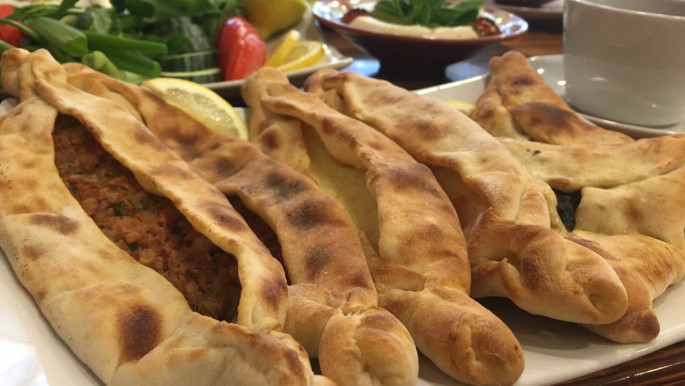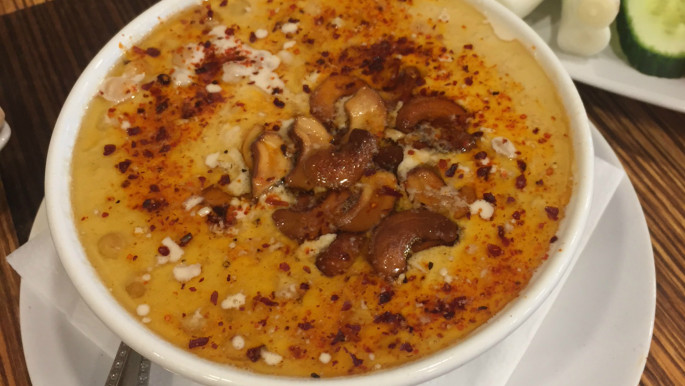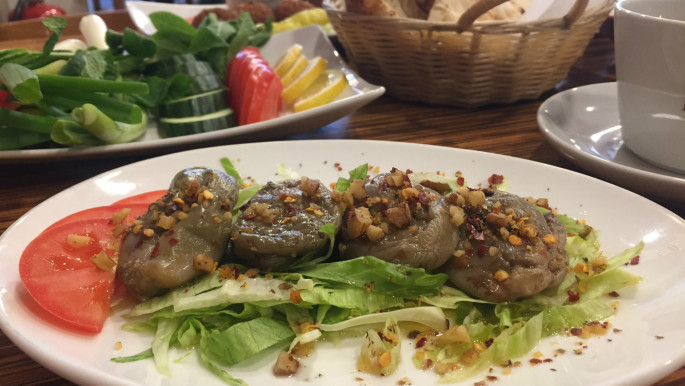Breakfast like a king at London's newest Syrian restaurant
"Breakfast like a king, lunch like a prince and dine like a pauper" is a saying often repeated across the Arab world. Now one of London’s latest Syrian restaurants have made it their mission to show what a king’s breakfast actually tastes like.
The recently opened Aleppo House is nestled snugly at the top of the main high road of vibrant Willesden in north-west London. Its owners, having fled the war in Syria, founded the venue to give locals a taste of Aleppo – and possibly hold onto the aroma of their homeland.
Upon entering, the visitor is struck by the huge picture of the grandiose citadel of Aleppo that covers the back wall and overlooks the seating area as well as the grill and the all-important oven.
Citrus scents from baskets of fresh fruit mingle with the appetising smell of baked bread. While the seating area is not particularly spacious, it is cosy enough and the large glass windows lets you see a steady stream of fashionable people walking past.
While breakfast can be a hurried affair for many, for Syrians it is the most important meal of the day.
At 11am, it is the chef Basil himself who greets us as we enter, and I ask him what precisely is ‘an Aleppan breakfast’. A list of names tumbles out: "Fatteh with chickpeas, Foul Mudammas, Magdoos, Mana'eesh, Fatayr, Falafel...".
I order one of each – fully endorsing the importance of breakfast.
 |
| The Fatayr had been moulded into their traditional shape |
With the oven in the dining hall, it is not long before the air becomes tantalisingly redolent, and the assortment of baked breads are served within ten minutes.
Cut into quarters and served upright, the Manaeesh have light and fluffy baked dough topped with the right amount of thyme and olive, and hits the mark perfectly.
Next came the Fatayer, moulded into a traditional oblong shape. The first piece has a white cheese topping which is creamy without being overly moist. The second and third pieces, one topped with minced meat and the other with cooked spinach, retain a good balance between moisture of the topping and crisp texture of the dough.
Downing them all without effort testifies to the lightness of the varied Manaesh and Fatayr, staple breakfast dishes of the Levant that many get wrong but Aleppo House gets very right.
Next came the Fatteh – a popular breakfast dish of toasted bread, mixed with strained yogurt, steamed chickpeas and olive oil, seasoned with cumin. It is covered a layer of hot olive oil, chilli flakes and toasted cashews, giving it a complimenting deep nutty flavour. With Fatteh being an acquired but beloved taste, the one here was satisfactory though was perhaps overly oiled.
 |
| Fatteh is a popular breakfast dish made of toasted bread mixed with strained yogurt steamed chickpeas and olive oil |
Before I could finish, the chef places a plate of Foul Mudammas (fava bean dip) on my table. I start eating it with bread and a side of fresh vegetables. The skill of the chef is once again apparent as the Foul presents an excellent mix of roughly blended beans with a subtle yet potent spicy kick.
It's time for a break, and I ask the chef why he fled Syria.
"I left to get away from forced army conscription," he tells me. "I was in my third year studying for a law degree at university. I left that all behind and came here."
The aspiring lawyer said his cooking skills however were forged deep in the restaurants of Syria. "I started cooking in 2006, working part-time in a restaurant while studying."
At the corner of the table, the recently-placed Maqdoos catches my eye. Even at its best the dull-grey and slime-like dish never looks appetising, but it remains a household favourite from Iraq to Lebanon.
Pickled mini aubergines are stuffed with red peppers and walnuts and then covered in olive oil and crushed nuts. This may be an acquired taste for some, but one I have long loved, and here the careful combination of the sharp acidic kick of the pickle and the dull-earthy taste of the walnuts works well.
 |
| Even at its best the dull-grey and slimy looking Maqdoos never looks appetising |
Now uncomfortably full, it seems breakfasting like a king or a queen needs stamina. I was however helpless to resist the plate of falafel. The first was crispy and flavoursome, the second I dipped into the side plate of creamy traditional hummus and it hit the mark again.
I ask for another cup of the crisp black tea to help wash it all down.
Still unable to move, the citadel of Aleppo once again catches my eye. Within it is a small caption listing the great civilisations that made the city the great bastion of culture it once was and will surely again be. This breakfast was a good reflection of this wonderfully mixed heritage – an evolution of thousands of years of culinary skills until near perfection.
If you wake up hungry next Sunday, forget the full English fry-up and try the fuller Syrian instead.
Halal: Yes
Alcohol served: No





 Follow the Middle East's top stories in English at The New Arab on Google News
Follow the Middle East's top stories in English at The New Arab on Google News


